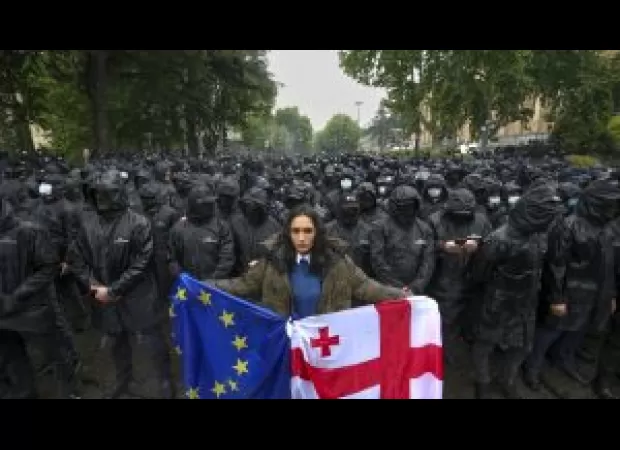Demonstrators in Georgia's capital city are rallying against a new Russian law.
Protesters in Tbilisi, Georgia are outraged over a bill that could threaten free speech and the country's hopes to join the EU.

Tbilisi: The city was filled with a massive crowd of protesters who had taken to the streets to express their anger towards the recent approval of a controversial bill in Georgia. The bill, known as the "foreign influence" bill, has been met with criticism from many who see it as a threat to free speech and the country's efforts to join the European Union. The decision to pass the bill was made by lawmakers on Tuesday, sparking immediate outrage among the citizens.
As the news spread, the crowd in front of the parliament building grew larger and more agitated. Some protesters even tried to dismantle the metal barriers surrounding the building, resulting in clashes with the police. Reports later showed that several individuals were arrested, with one sustaining serious injuries to the head.
As the night went on, the protests only intensified. Thousands of people marched towards Heroes Square, which is located about two kilometers from the parliament building. They blocked off streets leading to the square, causing major disruptions to the city's traffic.
The bill itself requires media outlets, non-governmental organizations, and other non-profit groups to register as "pursuing the interests of a foreign power" if they receive more than 20% of their funding from abroad. According to the government, this measure is necessary to prevent foreign actors from destabilizing the country's politics. However, the opposition has condemned the bill, calling it "the Russian law" due to its similarity to legislation used by Moscow to silence critics of the Kremlin.
The international community has also expressed concern over the bill's passing. European Council President Charles Michel stated that for Georgia to join the EU, they must uphold the fundamental principles of the rule of law and democracy. Similarly, the United States' White House press secretary, Karine Jean-Pierre, expressed deep worry about the legislation, emphasizing that it goes against democratic values and distances Georgia from the EU's principles.
The US Assistant Secretary of State for Europe and Eurasia Affairs, James O'Brien, went even further, warning that if the bill is not in line with EU norms and if there is violence against peaceful protesters, the US will reassess its relationship with Georgia.
This is not the first time the governing Georgian Dream party has tried to pass this bill. Last year, they were forced to withdraw it after facing pressure from street protests. The recent demonstrations, which have been ongoing for weeks, have turned violent at times, with the police using tear gas and water cannons to disperse the crowds.
President Salome Zourabichvili, who has been at odds with the ruling party, has promised to veto the bill. However, with Georgian Dream's majority in parliament, they have the power to override her decision. Zourabichvili now has 14 days to take action.
The tension surrounding the bill has caused deep division within the country. During a parliamentary session, a fight even broke out between lawmakers from opposing parties. The head of the main opposition party, Levan Khabeishvili, accused a Georgian Dream lawmaker of orchestrating violence against opposition supporters. The heated debate only added to the already charged atmosphere.
Despite the chaos, the protesters remained united in their cause, fighting for Georgia's future in Europe. Many prominent opposition figures spoke out against the bill and the actions of the ruling party, with one even accusing them of betraying the country's European aspirations. As the situation continues to unfold, it remains to be seen what the next steps will be for Georgia and its relationship with the international community.
6 Views


